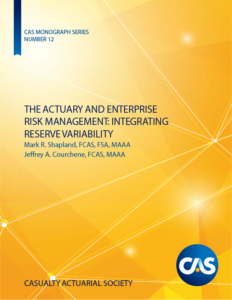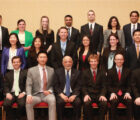
The “Making Things Happen” column features CAS and iCAS members who serve the associations in many capacities and enrich the volunteer experience for all.
CAS Monographs delve deep into specific topics relevant to P&C actuaries, providing in-depth analyses and insights not found in other industry publications. They cover a wide range of subjects such as risk modeling, reserving methods, pricing techniques and emerging trends in insurance. Monograph content undergoes rigorous peer review, ensuring that each contribution meets high academic and professional standards. Actuaries can trust the accuracy and reliability of the information presented, making it a valuable resource for their work. Many shape exam test questions for years to come.

Monographs often include practical case studies, examples, and real-world applications of actuarial concepts. This helps actuaries understand how theoretical principles translate into actionable insights for insurance companies, regulators and other stakeholders.
While it is easy to attribute the excellence of the literature to incredible authors, Monographs would not be possible without the help of the Monograph Editorial Board (MEB), led by Brandon Smith, FCAS, MEB chair.
“I believe the Monographs are some of the very best resources we have in actuarial literature for authoritative and comprehensive coverage of technical topics for practitioners,” said Smith. “My goal is to maintain their quality and relevance.”
As MEB chair, Smith leads the group’s monthly meetings. “However, as we are a [board], decisions are not made unilaterally, so I wouldn’t say my responsibilities are too different from other members,” said Smith.
The key volunteer role within the MEB is being a monograph “shepherd.” For each monograph, the working group assigns a liaison who stays in touch with authors and keeps the MEB informed of progress.
“This person has the opportunity to steer and shape a monograph and work with the authors to ensure we stick to our rough deadline,” said Smith. “Of course, we are all volunteers, both authors and MEB members, so timelines tend to be guides. The liaison member aims to keep the momentum going.”
“We have a pretty large pipeline of monographs at the moment, including ones on penalized regression, mixed models, machine learning and capital modeling. All are at various stages of development, and I look forward to seeing them all come to fruition.”
Smith’s proudest accomplishments are the monographs that make it onto the CAS syllabus. “These texts are widely read and studied and convey the knowledge required to become a credentialed P&C actuary,” said Smith. “I hope to see more future monographs added to the CAS syllabus.”
Smith graduated from Fordham University with degrees in mathematics and economics before earning his FCAS and will soon be completing a master’s in analytics.
“Volunteering allows me to interact with leading actuaries across diverse backgrounds, specializations and skills. It is a way of engaging with the wider community beyond your coworkers that I highly recommend.”











